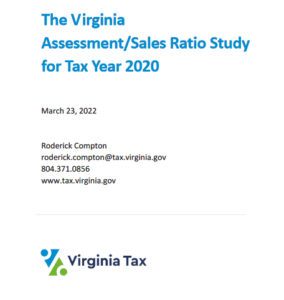 by Dick Hall-Sizemore
by Dick Hall-Sizemore
I am following up on James Sherlock’s article on local property taxes.
In Article X, sections 1 and 2, the state constitution requires that all property be taxed at fair market value. There are exceptions, but those are not relevant to this discussion. So, there you have it. Unless the constitution is amended, localities must tax property at fair market value.
State law recognizes the impracticality of assessments keeping up with fair market value on a continual basis.
One of the main reasons that assessments lag behind market value on a statewide basis is the varying frequency of reassessments by localities. State law requires cities to reassess every two years, except that cities with a population less than 30,000 can use a four-year reassessment cycle. For counties, the law allows them to go four years between reassessments, except for counties with a population under 50,000 , and the counties of Augusta and Bedford, which are allowed a five-year or six-year cycle.
All counties and cities that employ at least one full-time certified real estate appraiser or assessor may conduct annual or biennial reassessments. Thirty localities have annual reassessments. For some counties, such as Buchanan and Prince Edward, the last reassessment was in 2015. Residents in localities with long cycles of reassessment often experience sticker shock when they get their reassessment notices in the mail. (That is true for some of us in a county with an annual reassessment!)
Each year the Virginia Department of Taxation (“Tax”) publishes an Assessment/Sales Ratio Study, in which it compares assessments with the most recent property sales in the jurisdiction to arrive at the median sales/assessment ratio for that locality. The most recent study, for the tax year 2020, was released in late March. It determined, on a statewide basis, that the median assessment/sales ratio was 87%. In summary, based on Tax’s statistical analysis, on a statewide basis, property is assessed at 87% of market value.
As would be expected, the individual local assessment/sales ratios vary widely. They ranged from 73.5% for Caroline County to 103.38% for Bath County. Interestingly, a long reassessment cycle does not automatically result in a low assessment/sales ratio. or example, Buchanan County, with a six-year reassessment cycle and 76 sales of property in 2020, had a reassessment/sales ratio of 99.46%, although its last reassessment had been in 2015. Not much property changes hands in Buchanan County and the prices remain stable.
State law requires the state to hold back on the distribution of the local share of ABC profits for any locality for which the reassessment/sales ratio is lower than 70% or higher than 130%. In effect, the General Assembly has decreed that any locality assessing property, on a locality basis, between 70% and 130% of its market value is in compliance with the constitutional requirement.
In those jurisdictions in which assessments have increased significantly from the last reassessment, revenue from the real estate tax has the potential to increase proportionally. Localities, of course, have the option of reducing their real estate tax rates to a level that the actual property tax due on one’s property would not increase. In fact, state law requires a locality to have a public hearing if property tax revenues would increase by more than one percent after a reassessment without a change in the rate. Governor Youngkin advocated that, instead of a public hearing, the locality must hold a referendum before it could increase its property tax revenue more than one percent after a reassessment.
My Soapbox
A tax on property is a holdover from the Commonwealth’s agrarian economy. Also, local governments, even rural counties, provide significantly different levels of service than they did even 50 years ago. (For example, many, if not most, counties provide some level of emergency fire and medical services, rather than relying exclusively on volunteer squads.) Furthermore, the state imposes financial mandates on local governments, ranging from funding educational Standards of Quality to water quality. In the name of fairness and ease of administration, Virginia needs to abandon the property tax as the chief source of local revenue and allow localities to piggy-back on the state income tax. However, doing so would probably require an amendment to the state constitution as well as extensive analysis and work on enabling legislation. I doubt if the General Assembly has the stomach for such work these days.

Leave a Reply
You must be logged in to post a comment.